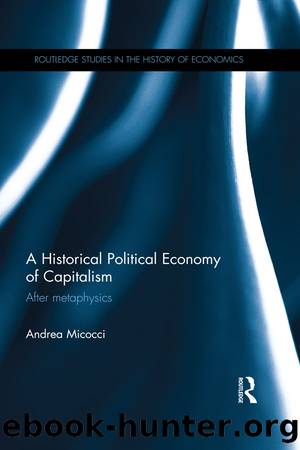A Historical Political Economy of Capitalism by Micocci Andrea;

Author:Micocci, Andrea; [Andrea Micocci]
Language: eng
Format: epub
ISBN: 9781317273288
Publisher: Taylor and Francis
4.2 The discourse of economics1
In this section, we will discuss Hume, Smith’s invisible hand and, indirectly, Mandeville, before then introducing the present-day criticism of contemporary economic theories. As in the preceding chapters, we will see that seeking to extricate scepticism, Stoicism and Epicureanism from one another in the authors we study is a pointless exercise. We will start by discussing Hume’s 1751 Principles of Morals (2009), which is the least radical, in terms of the argument we are seeking to put forward, when compared with Hume’s other works. This is not a problem, however. On the contrary: although we are looking for some clear ideas in Hume, we do not want to bestow on him a coherence of our own. Authors must be left free to convey, if that is the case, the flavour of their own doubts and, indeed, of their incoherencies and rethinking.
The other works that will be considered in the present section are his 1739–40 Treatise of Human Nature (2011), the 1748 Enquiry Concerning Human Understanding (2008) and the 1754 Dialogue Concerning Natural Religion (2006). In them, we will find, in their most straightforward and radical form, the arguments leading to the idea of liberty as chance, which we need in order to proceed with our materialistic argument. Only when armed with this, and with its complementary argument on society and politics as the source of regularity and inertia (and evil), can we look at economic theories, be they Smith’s invisible hand, modern mainstream economics or conventional Marxist political economy.
The spectre of Mandeville (1997) and his supposedly immoral and, in the words of Adam Smith, ‘pernicious’ doctrines will haunt us throughout the whole section and beyond. The question of private vices and public virtues, which has exercised a lot of brilliant minds besides Adam Smith, is not, however, fundamental for us here. If the issue of liberty as chance is central – the validity of which we will endeavour to illustrate in what follows – and if the discourses and words of economic theories refuse to acknowledge it, then there are grounds to hypothesize a completely different, society-based theory of evil. The result of this is that ethics and morality are irrelevant to our theoretical purposes here.
Hume (2009) presents a number of themes helpful for kicking off our discussion. In the first place, as announced above, this text throws some doubts on what we will say when studying his other works. It is, in fact, the least intellectually subversive among them, at least for our purposes here. Its Epicurean scepticism is much less pronounced, and hypocrisy à la Mandeville and self-love are given a chance to be useful alongside convention. However, references to the intrinsic goodness of humankind and hints at the uselessness of languages, besides a final sceptical statement and an Epicurean excusatio non petita are found everywhere. Rounding it off, the dialogue at the end is a masterpiece of literary subversion of morals.
As with Adam Smith’s Theory of Moral Sentiments (2009), here too the main
Download
This site does not store any files on its server. We only index and link to content provided by other sites. Please contact the content providers to delete copyright contents if any and email us, we'll remove relevant links or contents immediately.
International Integration of the Brazilian Economy by Elias C. Grivoyannis(57271)
The Radium Girls by Kate Moore(10901)
Turbulence by E. J. Noyes(7031)
Nudge - Improving Decisions about Health, Wealth, and Happiness by Thaler Sunstein(6629)
The Black Swan by Nassim Nicholas Taleb(6182)
Pioneering Portfolio Management by David F. Swensen(5599)
Rich Dad Poor Dad by Robert T. Kiyosaki(5140)
Zero to One by Peter Thiel(4816)
Man-made Catastrophes and Risk Information Concealment by Dmitry Chernov & Didier Sornette(4728)
Secrecy World by Jake Bernstein(3773)
Millionaire: The Philanderer, Gambler, and Duelist Who Invented Modern Finance by Janet Gleeson(3565)
Skin in the Game by Nassim Nicholas Taleb(3455)
The Age of Surveillance Capitalism by Shoshana Zuboff(3411)
The Money Culture by Michael Lewis(3276)
Skin in the Game: Hidden Asymmetries in Daily Life by Nassim Nicholas Taleb(3259)
Bullshit Jobs by David Graeber(3171)
The Dhandho Investor by Mohnish Pabrai(3161)
The Wisdom of Finance by Mihir Desai(3069)
Blockchain Basics by Daniel Drescher(2883)
